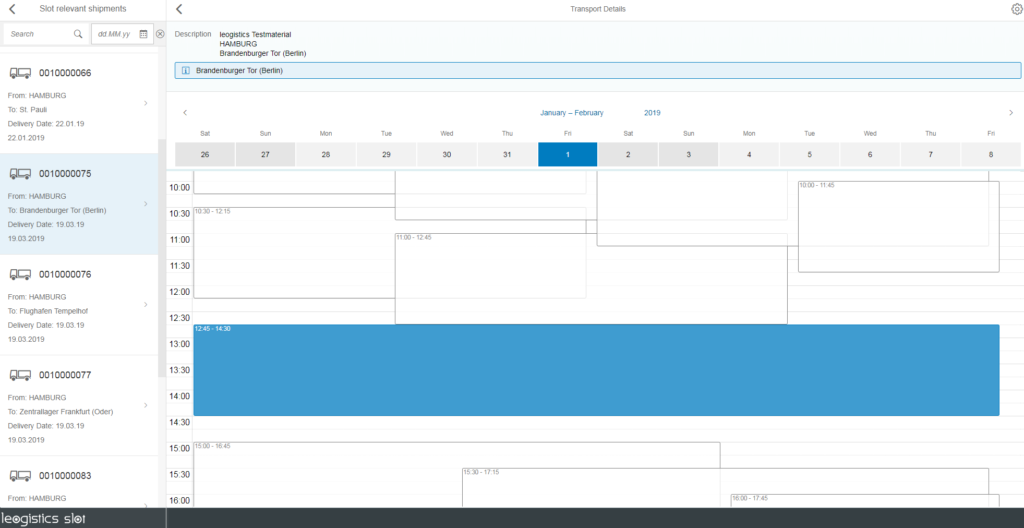Slot Booking – How to harmonize different interests from different parties
Making production processes more efficient while reducing storage costs forces shippers to operate the inbound and outbound processes just in time. The necessity of coordinating these processes does not end at the loading ramp. Drivers as well as forwarders need to be involved in these tightly synchronized inventory control processes in order to optimize the use of resources and guarantee the efficiency of transport.
Different interests of those involved
The relation of shippers, forwarders and drivers implies similar challenges from opposite perspectives: accurate scheduling on one hand often meets a lack of transparency on the other.
- The “expected dwell time” means planning security for forwarders because the dispatcher can include standby time when planning routes. Thus, delays that emerge while charging and discharging start to become apparent. They cause financial losses and can endanger follow-up orders. In case deliveries are to be consolidated at a hub, delays can cause a domino effect.
- For shippers, it is very important that trucks arrive on time, in order to match the plan. Transparency of planned and actual arrival times is very important. Planned appointments have to be met and drivers need to stick to their time slot to ensure process efficiency. Otherwise, the availability of doors and loading equipment cannot be guaranteed. In many cases, waiting trucks outside or in the yard do not match the security guidelines and can be a risk due to physical constraints.
- Drivers have to meet the expectations of two other parties: They need to satisfy the contractor as well as the customer. Their target is to comply with the delivery date and their specific driving and rest times.
Advantages of a time slot management solution
Predictability is the key for any cost reduction in trucking processes for shippers and forwarders. Only when goods receipt and goods issue are announced, it is possible to plan products in real-time and provide the required resources.
The main targets for the implementation of a slot booking management are comprised by:
- Reduction of waiting times
- Planning reliability and planning accuracy
- Smoothing the workload
- Even utilization of gates, employees and loading equipment
- Increasing productivity through closer timing of activities
- Basis for Just-in-Time and Just-in-Sequence Processes

By loading the video, you are agree to YouTube privacy policy
Learn more
Who bears the responsibility?
The booking of time slots is usually transferred to the forwarder. On the other side, the shipper determines the business rules, the time slot capacities, the opening hours, length, and number of available slots. This results in the responsibility of the shipper to balance the available capacity, to smooth out the traffic on the yard, thus avoiding waiting times.
Collaboration and coordination
The crucial factor for an efficient interaction of all participants is that the shipper forms the booking of time slots as proactively as possible. From our point of view, the following points can be considered as successful incentives:
- Ensure a preferential treatment of routes with booked time slots
- Agree by contract on a bonus system
- Grant access to premium services, such as performance reports
- Influence the forwarder selection through a ranking
- Free of cost bookings for the forwarders
- Additional incentives for the driver, like amenities on the yard
The binding compliance with the booked time slots should be self-evident for both sides, but it doesn’t stop there: Significant impacts for the compliance with time slots are factors, e.g., traffic situations and weather. Implementing a Track-and-Trace solution can help to reduce the number of drivers arriving outside their scheduled time slots.
Dynamic determination of time slot lengths
In addition to the external influences, time slot planning must extend to the warehouse. By placing dynamic time slots depending on the available resources (such as personnel, loading ramps, forklifts), cargo (for example, palletized goods) and the transport priority, a harmonized and efficient planning process can be realized.
Collaboration in the supply chain
Only when it comes to a WIN-WIN-WIN situation through time slot management, the full potential of the solution can be unleashed. The route of the shipper gains attractiveness for the driver and forwarding company. The shipper complies with the service level agreements regarding truck throughput time, resulting in a collaborative logistics process that is seamless.
leogistics Slot
With our time slot management tool, we offer the opportunity to move in this area of uncertainty with an air of confidence. Forwarders receive the request to book a time slot via a web portal or by e-mail. General conditions regarding restrictions for the booking, reservation and management of regular time slots, along with determination of the time slot length are the responsibility of the shipper.

If you have any questions about this or other topics in the blog, please contact blog@leogistics.com.
Jan-Philipp Horstmann
Senior Consultant SAP Logistics
Stefan Görlitz
Senior Account Manager



